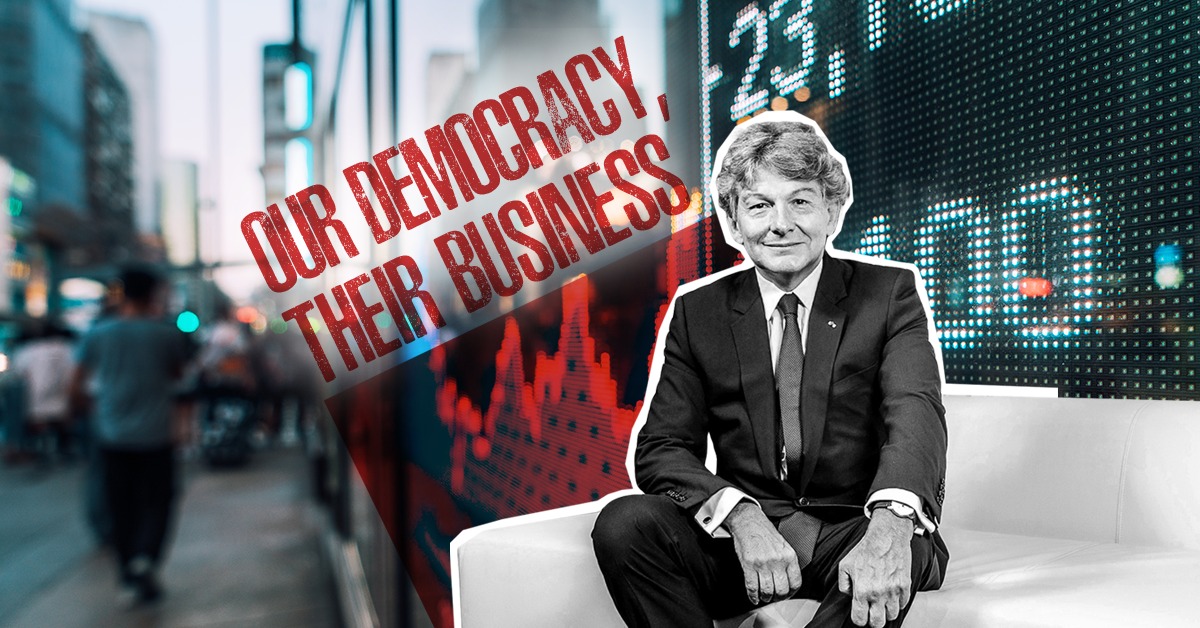
Nearly done, but let's remember what matters

The corporate sovereignty phenomenon is a global one (and it spreads further)
Summary: The Thierry Breton series has almost reached its end, but it is easy to lose sight of why it's important and in what way
THE Breton series' epilogue is still in preparation and there's a mere possibility of extending it in light of the prosecution of Breton's successor (all over the news last week! Even SUEPO mentioned it with several links in the official Web site five days ago).
We've come to recognise that there's a bit of a problem; at the start of the series (which we had preceded with disclaimers a number of times [1, 2]) we sought to clarify the intent, purpose and importance of it. Some of that was likely missed or forgotten when we composed/published the 24 parts (the latter of which were rather long, spanning about 10 pages of 4A papers each). For those who missed or skipped these, here's the whole lot:
We've published all the above under the polite/neutral heading Understanding Thierry Breton and it has since then attracted much interest from various circles, both political and technical. It's regretful that nowadays a lot of feedback gets 'lost' in the web of social control media. People had much to say, but it is difficult to locate; it's scattered.
The articles are very well ranked in search results (for English texts) as a lot of information on these matters is otherwise available only in French. In one particular regard the service we provide here is making key facts widely accessible to an audience outside France (or to people who cannot comprehend French).
"In one particular regard the service we provide here is making key facts widely accessible to an audience outside France (or to people who cannot comprehend French)."Our series can easily be mistaken for EU bashing, but nothing can be further from the truth. Those who respect the EU -- as I personally have for decades -- want to guard it from abuse. This means calling out foul play and nepotism or entryism -- the same sort of thing that ruined the European Patent Office (EPO).
One person asked us: "Where can I get a two or three paragraph summary of the series and why France's choice of European Commissioner is problematic?"
The answers ought to be evident from the above parts which, if put in paper form, span well over 100 pages in length. It's almost like a mini-thesis, a research project which is a well-sourced accumulation of facts. What readers make of these is up to them (links can be followed and stories studied in greater depth).
"It's almost like a mini-thesis, a research project which is a well-sourced accumulation of facts."A reader conceded that "it looks like a very exhaustive (no pun intended) investigation. While the epilogue is fresh in your head would you be able to do two general-audience paragraphs introducing the situation? Something introducing two or three of the major questions people unfamiliar with the situation should ideally ask and why it matters to them."
To properly convey all the pertinent issues one might want to quantify or enumerate them. Thierry Breton has a long career in a lot of places and scandals are difficult to keep abreast/count of. We've been told that the Wikipedia entry about Thierry Breton is very much sanitised, but Wikipedia wars (edit wars with PR agencies) aren't worth the time/effort. Thierry Breton is actually a symptom of a broader issue, which implicates a mostly French cabal that includes French IMF chiefs, several EPO Presidents (not just Battistelli), and the current French President, who puts in charge of the EU people who would likely let the EPO off the hook, even when it grossly violates long-cherished treaties to the detriment of the European public (and, expectedly perhaps, to the benefit of the rich, including Europe's richest, who is French and notoriously well-connected).
"...let's face it -- it's not too hard to check who owns pertinent publishers and why they cover particular affairs (or don't at all!) the way they do."Techrights never shied away from politics; when Obama was elected as president in 2008 we expressed worries he would serve corporate agenda (whilst acknowledging McCain would have been no better) and we constantly complain about Trump, whom we deem to be a symptom of an overstretched empire with growing inequality, poverty, conspiracy theories, and what some dub "late stage capitalism". To subject Europe to a similar level of scrutiny would only be fair and rational. People deserve to know the sort of world they live in (who's in charge, who's not accountable etc.) and if that means 'badmouthing' even so-called 'liberals' like Macron and Obama, then so be it. I myself don't come from a political or from a rich family; I don't think anyone involved in Techrights is particularly privileged; we compensate for that lack of so-called 'privilege' with curiosity and a constant thirst for knowledge. Our fact-checking skills are probably much better than that of oligarchs-owned media. And let's face it -- it's not too hard to check who owns pertinent publishers and why they cover particular affairs (or don't at all!) the way they do. One need not be cynical to insinuate that the public isn't being told the full/true story, as that might enrage some people and harm remaining legitimacy of the status quo. The "yellow vests" movement may be mocked by the media, but we know whose media. ⬆